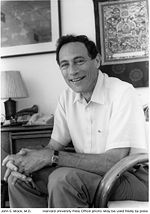John E. Mack
John Edward Mack (October 4, 1929, New York, New York–September 27,2004) was an American psychiatrist and author who won the 1977 Pulitzer Prize for biography with A Prince of Our Disorder: The Life of T.E Lawrence,[1] but was best-known to the general public as an investigator of supposed abductions by aliens in unidentified flying objects. This research, as well as his public statements concerning it in his later years, became controversial because of his position at Harvard Medical School and was not always met with acceptance by officials at Harvard University. Following the publication of his 1990 book, Abduction: Human Encounters with Aliens. the university, for the first time in its history, launched an investigation of the work of a tenured professor.[2] After much controversy in faculty circles, Mack retained his tenure.
Career
Mack graduated from Oberlin College in 1951, received his medical degree from Harvard in 1955, and then graduated from the Boston Psychoanalytic Society and Institute. He joined the Harvard Medical Facility in 1964 and became a medical professor in 1972. He served in the U.S. Air Force from 1959 to 1961.
Psychiatry
Mack lived in Cambridge, Massachusetts where he started the psychiatry unit at Cambridge Hospital where he served as chief of the department from 1969 to 1977.[3] In 1977, his book, A Prince of Our Disorder: The Life of T. E. Lawrence won the Pulitzer Prize for Biography. Mack was also an assistant editor ofThe Journal of the American Psychoanalytic Association and was on the editorial board of The American Journal of Psychoanalysis.
During his career, Mack was "...was drawn to psychoanalytic analysis of the misunderstood or vulnerable, including children contemplating suicide, teenagers troubled by the threat of nuclear war and finally, people plagued by what they believed to be recurrent alien encounters".[4]
Study of abduction
He founded the John E. Mack Institute in 1989 as the Center for Psychology and Social Change, a year before the publication of his first book on alien abduction. In 1993, he started the Program for Extraordinary Experience Research with a grant from Laurance Rockefeller.
Harvard review
After publication of the 1990 book, a Harvard faculty committee was formed to review Mack’s “clinical care and clinical investigation of his subjects.” After 14 months of investigation, it released a statement saying that it "reaffirmed Dr. Mack's academic freedom to study what he wishes and to state his opinion without impediment."[4]
Abduction
Mack interviewed approximately 200 people who reported encounters with extraterrestrials, according to Feeney. Feeney also wrote that Mack believed alien encounters were more of a spiritual nature rather than a physical one.[3]
"No one has been able to come up with a counter-formulation that explains what's going on," Dr. Mack said in a 1992 Globe interview in which he discussed his view of alien encounters. "But if people can't be convinced that this is real, that's OK. All I want is for people to be convinced that there's something going on here that is not explainable,” wrote Feeney concerning Mack's research.[3]
During an interview with the Public Broadcasting System (PBS) NOVA television series Mack discussed his research into the alien abduction phenomena. He said during the interview he found the alien abduction phenomena at first hard to take seriously.
I had very little place in my mind to take this seriously. I, like most of us, were raised to believe that if we were going to discover other intelligence, we'd do it through radio waves or through signals or something of that kind.
.... I've now worked with over a hundred experiencers intensively. Which involves an initial two-hour or so screening interview before I do anything else. And in case after case after case, I've been impressed with the consistency of the story, the sincerity with which people tell their stories, the power of feelings connected with this, the self-doubt—all the appropriate responses that these people have to their experiences.[5]
Marriage & personal
He was born October 4, 1929, in New York to Edward C. Mack and Ruth Prince Mack, and died September 27, 2004, while attending a conference about T.E. Lawrence in England. He was married to Sally Stahl Mack. Their marriage ended in divorce in 1995.[3]
References
- ↑ John E. Mack (1976), A Prince of Our Disorder: The Life of T.E Lawrence, Little, Brown
- ↑ Angela Hind (8 June 2005), "Alien thinking", BBC
- ↑ 3.0 3.1 3.2 3.3 John E. Mack Institute
- ↑ 4.0 4.1 Jennifer Bayot (30 September 2004), "Dr. John E. Mack, Psychiatrist, Dies at 74", New York Times
- ↑ Interview with John Mack, Psychiatrist, Harvard University, NOVA, Public Broadcasting System
